Have you ever wanted to live a healthier, more conscious lifestyle but didn’t know if you actually could until you had a salary or your own place? I’ve been there before. After all, we can’t all be Sustainable Sally who grows her own food and powers her home exclusively with solar power.
But being sustainable isn’t as impossible as you think. In a lot of ways, it’s actually just about a switch here and an adjustment there. Totally doable.
You can definitely master these ways to live a more sustainable life now, so don’t even think about procrastinating.
1. Quit purchasing plastic water bottles.
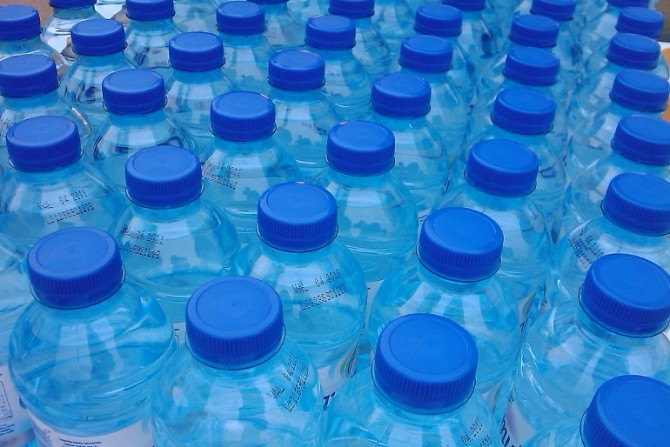
Photo courtesy of ricardo / zone41.net
This one is a no-brainer. Plastic seriously sucks, and single-use water bottles are one of the main ways in which it has infiltrated our daily lives.
Not only is plastic wasteful and often not recycled, but it’s also pretty unreliable. When a plastic bottle is warped or heated (think: sitting in your garage or car), the chemicals that make up its composition can actually leak into the water it’s carrying. I’ll pass on gross toxins in my agua, thanks.
Use a reusable water bottle if you need H2O on-the-go. Tap water is better for you than bottled water anyways because the EPA, which regulates tap water, has higher quality standards than the FDA, which regulates bottled water. And if you’re a water snob, most people really can’t taste the difference between the two.
Just say no, please.
2. Buy exclusively Fair Trade coffee.

Photo by Jennifer Cao
Yes, this might cost a bit more, but you’re paying for justice. Fair Trade Certified products ensure that people are working under safe conditions and getting paid what they deserve – a highly sustainable and trustworthy system. Your morning cup of joe can actually help someone other than you, which rocks.
Fair Trade products are also committed to the environment and global development as a whole. When you join those who are buying Fair Trade coffee, you support responsible business and the fair treatment of workers with your wallet.
3. Get your kitchen stuff secondhand.
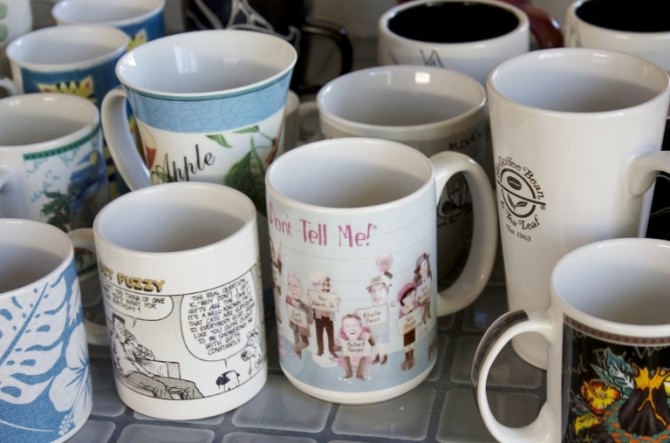
Photo courtesy of Flickr user Ewen Roberts
You probably already have a lot of kitchen essentials, but if you find yourself needing something else in the future, check thrift stores and garage sales before purchasing something brand spankin’ new.
It’s much more sustainable to use what’s already been produced than to require new products every time you have a kitchen need– it’s just common sense. Plus, you can often find a lot of quality cookware secondhand, so you could potentially recycle someone else’s great stuff.
As long as you can give your items a good washing, there’s really no reason not to buy everything secondhand. Oh, and it’s cheaper. Have I convinced you yet?
4. Bring reusable bags to the grocery store.
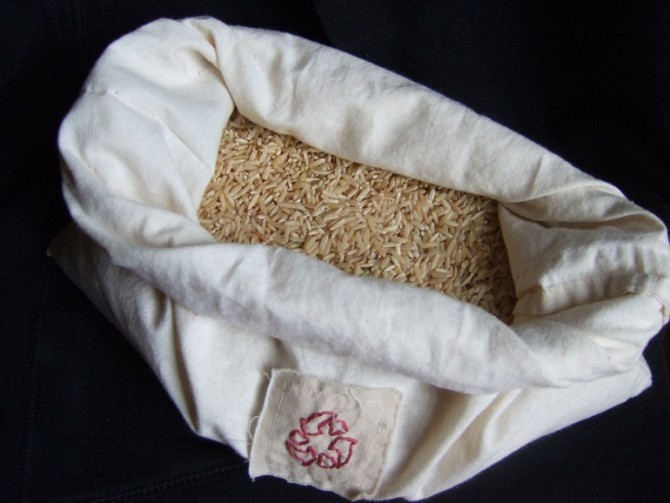
Photo courtesy of Flickr user Bowen Murphy
DOWN WITH PLASTIC BAGS. Sorry, but this one gets me emotional. Plastic grocery bags suck to begin with, so I wouldn’t be surprised if this is one of the suggestions on the list you’ve already tackled.
If you don’t already know all of the reasons why plastic bags are basically killing the planet, you can read about them here.
Not only can you use large reusable bags to carry groceries home, but you can also purchase small reusable bags in order to avoid those produce bags with the annoying little twist-ties. Those are terrible, too.
Just go with reusable bags all around and you’ll save thousands of plastic bags from ending up in landfills. You’re basically a hero.
5. Grow your own herbs.
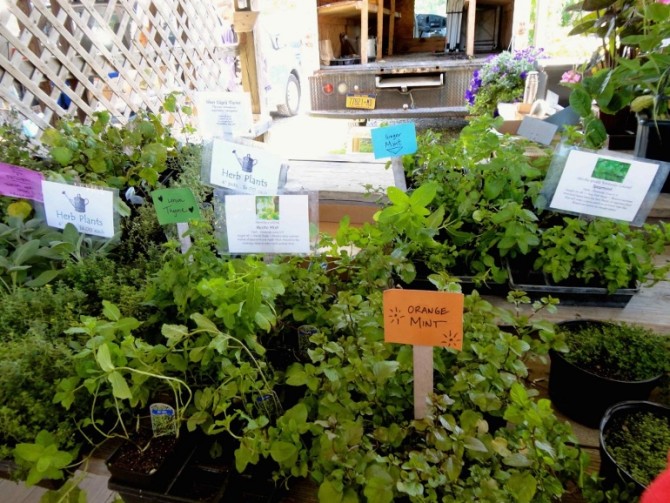
Photo by Jeanne Kessira
Sustain your personal love for cilantro and mint by growing your own herbs at home. You can learn just how to do it with this perfect herb-growing guide.
Think about it: If you potted a couple plants and remembered to tend them, you wouldn’t have to buy herbs ever again. It would save you money and guarantee that your herbs were grown organically.
It’s not a full garden, of course, but it’s definitely a start.
Sustainability is all about products and methods that are both healthy and maintainable for an indefinite period of time. Growing your herbs tackles both of these requirements. Not only do you get responsibly grown, organic herbs (which are better for the plants and your body), but you also trash the need for repeated purchases that temporarily satisfy your herb needs.
6. Bring your own container instead of using to-go cups.

Photo by Rachael Piorko
Travel mugs are beautiful things because they’re waste-free, and who doesn’t love to travel with coffee?
Portable drinkware is great for the environment because it decreases the daily toll that takeout cups take on the world’s garbage. Portable drinkware is great for you because a lot of coffee and tea shops will give you a slight discount for bringing in your own container.
See? These aren’t so difficult at all. You can bring a simple mason jar to Starbucks and automatically live more sustainably. Hipsters know what’s up.
7. Learn how to shop for organic foods.
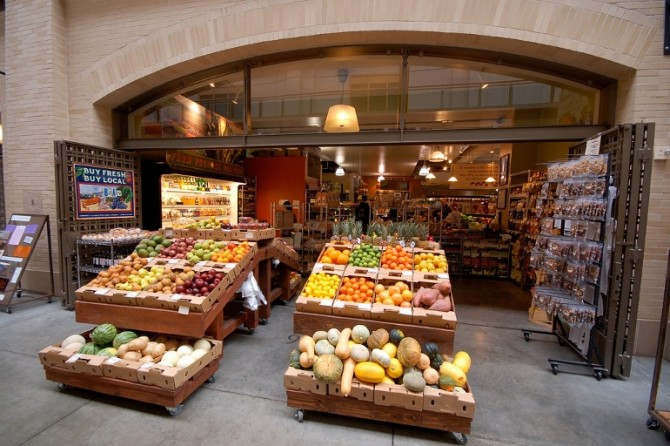
Photo courtesy of Flickr user Yue Tian
Ideally, the most sustainable way to shop would be to purchase almost entirely organic products. This wouldn’t be just for the sake of your well being, but also for the sake of the planet. Practically everything you bought would be raised under eco-friendly conditions, which are both maintainable (score) and respectable (booyah).
That being said, organic food can get expensive, so the quickest and easiest way to be sustainable on this front is to get picky.
There are certain fruits and vegetables that you should definitely purchase with organic labels; these are referred to as the “dirty dozen,” although the list varies, so it’s a bit over a dozen. Stick with organic apples, peaches, nectarines, strawberries, grapes, celery, cherries, spinach, sweet bell peppers, blueberries, cucumbers, cherry tomatoes and potatoes.
But there are also other items in the produce section that your body wouldn’t be able to tell as well if it were organic or not. These are called the “clean fifteen,” which includes pineapples, mangoes, kiwi, grapefruit, watermelon, cantaloupe, avocados, corn, cabbage, asparagus, eggplant, frozen sweet peas, onions, bananas and cauliflower.
If you can’t swing an all-organic shopping cart, don’t sweat it. By making a handful of specific decisions while you’re in the produce aisle, you can still leave a significant mark in the world of food consumption.
8. Stop using paper plates and plastic silverware.
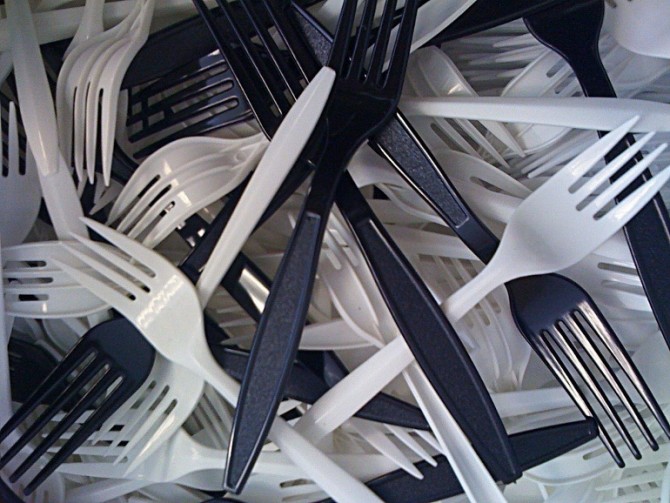
Photo courtesy of Neil Kandalgaonkar
Need I say it again? I want to curb-stomp plastics to the ends of the Earth. In fact, I firmly believe that that actually needs to be done.
Using plastic silverware, and plastic or other disposable plates, creates unnecessary piles of crap in landfills everywhere. Yes, they may be more convenient in the short-term, but in the long-term they mess this world’s already-overwhelming trash problem up.
I beg you: Use your own plates and silverware and then give your dishwasher a great workout. Don’t buy into the paper plate and plastic fork phenomenon. Is it politically incorrect to call plastic evil? ‘Cause it’s evil, I’m sure of it.
9. Eat only responsibly-raised meat.
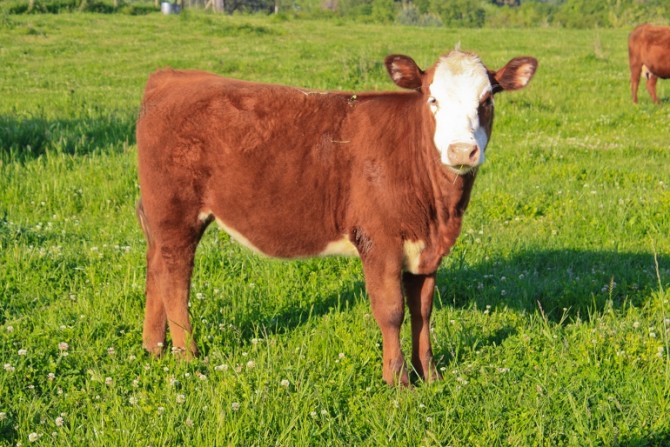
Photo courtesy of Flickr user Nick Ares
This one is a biggie. If you can’t decide where a good place is to start with sustainability, this is it. Commercial meat production is a gargantuan problem in our society that people either are ignorant about or decide to ignore.
Industrial farm-raised cows, pigs and chickens are brought up in tight and confined quarters, are often pumped full of antibiotics or hormones and most of the time eat diets that are consistent with what’s cheapest vs. what’s best for them.
Even if you’re not a crazy animal fan, you have to admit that this is not hunky-dory. Not to mention, the entire system takes too much and gives too little– in simpler terms, it can’t be maintained forever.
When you choose to purchase solely responsibly-raised meat, you cast your vote for the farmers that are doing things the right way. Not only are the animals treated humanely, but meat raised under organic conditions is better tasting and better for you. Check out this article if you need any more reason to avoid industrial meat.
10. Switch from paper towels to reusable cloth towels.
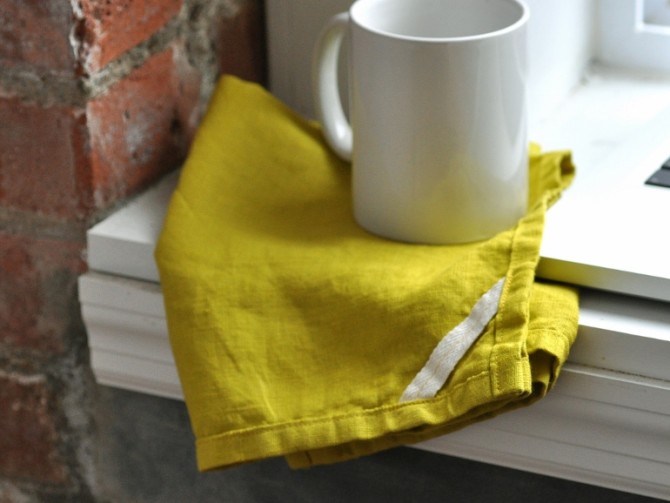
Photo courtesy of Small Batch Production
Paper towels – while often lifesavers – are tree ruiners. While the mesmerizing commercials sop up messes before your eyes, don’t let yourself be fooled. Paper towels are mega-wasteful and detrimental to the environment.
Instead, purchase a sweeping stack of cloth towels to keep on hand. Just throw them in the washing machine when you do a load of bathroom and dish towels. This switch saves you money (no more buying rolls and rolls of towels) and saves trees. Score.
11. Buy only what you need.
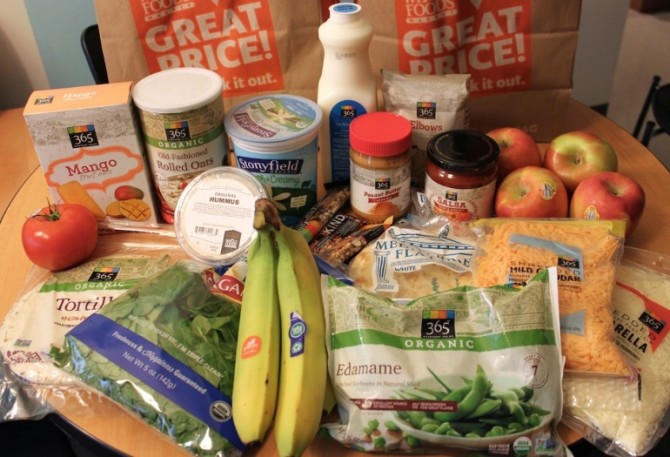
Photo by Rachel Weitzman
You would think this one would be self-explanatory, but you don’t know how many times I’ve seen people throw away whole bags of salad or a half dozen apples. In order to cut down on excess food waste (and to cut down on how much you’re spending on food), buy what you need and nothing else.
That means that even though bags of cheese are on sale this week, you should only grab as many as you need. That means buying only four apples instead of seven. That means buying just a small container of milk since you only use it for your cereal. You get the idea.
12. Compost your leftovers.
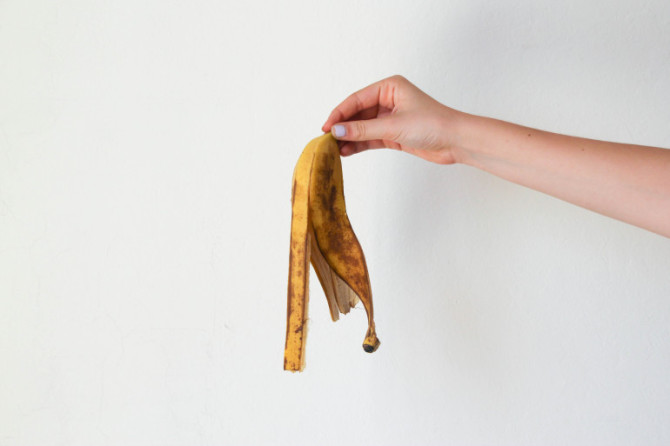
Photo by Helen Poon
Food waste is inevitable – and I’m not talking about leftovers. Fruit peels, egg shells, coffee grounds…it’s just a part of eating, but it doesn’t have to end with a sad trip to the dump.
Instead of tossing a lot of your food waste, start a compost bin or pile with your roommates. It requires a bit of knowledge, but nothing Google can’t help you with. Composting allows minerals and nutrients to be recycled, so instead of creating trash, food becomes soil, which grows more food, which can be turned back into soil, which… You get the idea.
Composting closes the food production loop because it takes what has been made and uses it to make more. That, my friend, is sustainable as all get out.
13. Shun Tupperware and plastic wrap.
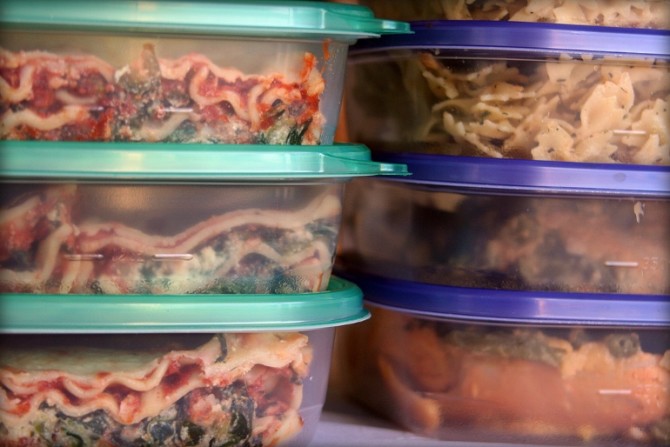
Photo courtesy of Flickr user Kathleen Franklin
Plastic = yuck.
Store your food in mason jars and metal containers instead of using plastic containers and plastic wrap. It’s possible that this could make your food last longer (mason jars are often airtight, unlike plastic storage containers), and it’s virtually waste-free. Plus, plastic containers could leech toxins into your food. Ew.
14. Enjoy seasonal foods.
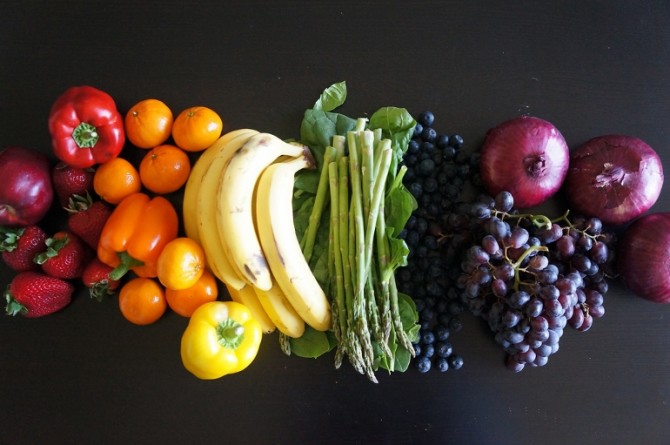
Photo by Sean Koetting
Eating seasonably is sooooooooo sustainable because it’s taking advantage of what the Earth yields in any given season. When you eat produce that’s out of season, it’s either being shipped in from somewhere else (hello, energy waste and nutrient loss) or being forced to grow under unnatural conditions. No thanks, I’ll pass.
I could go on and on about seasonal eating, or you could just read this crazy helpful article.
15. Invest in cloth napkins.
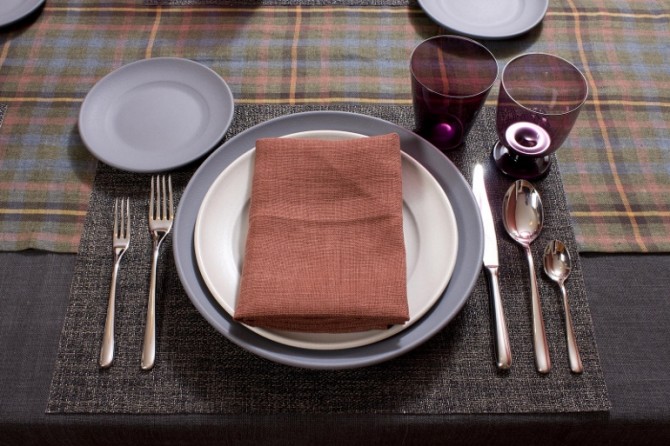
Photo courtesy of Flickr user Didriks
This one goes hand-in-hand with the paper towels suggestion. You can save a lot of trash and money by using cloth napkins instead of the disposable kind.
If you stay away from classic white and go for more spunky or stylish napkin options, this switch could be a fun way to accessorize your kitchen, too.
16. Go to the grocery store just once a week.
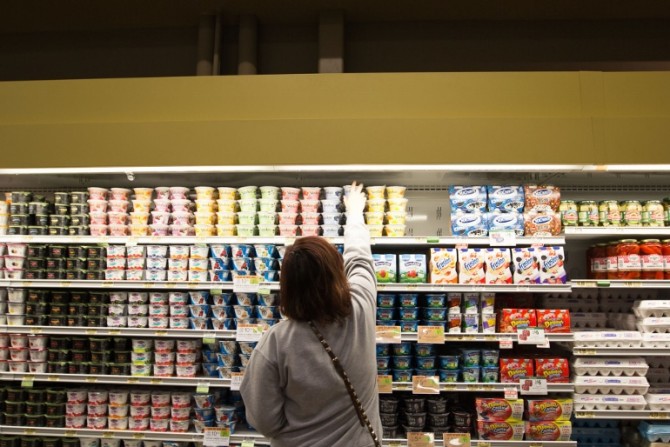
Photo by Hannah Cather
Not only will this practice save you gas money and decrease your car pollution, but it will also force you to be deliberate about buying enough food to last you for one week. An easy way to work with this habit would be to plan your meals ahead of time (or have a rough idea of what you’ll be cooking), make a list of ingredient and stick to it.
This will also save you time and keep you from making 1 am grocery store visits because you have nothing to eat for lunch the next day. Bonus points if you and your friends carpool together and do your shopping at the same time.
17. Run your dishwasher only when it’s full.
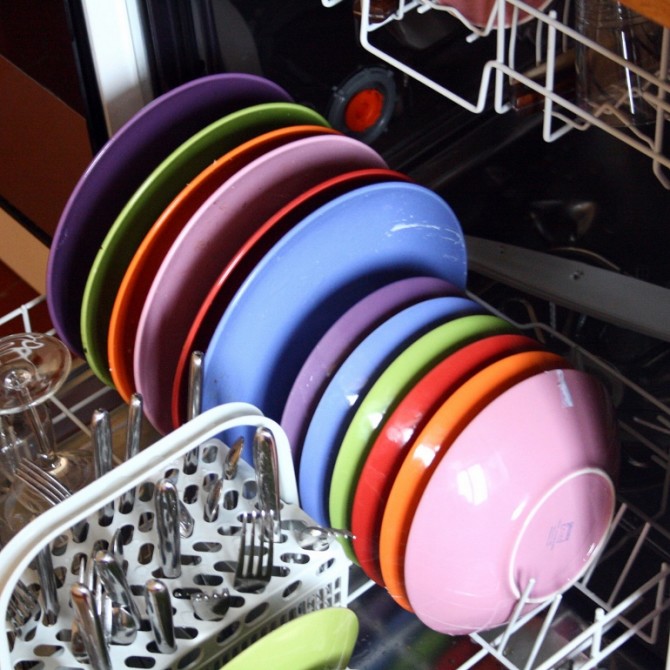
Photo courtesy of Flickr user Andrea Castelli
Conserve water by running your dishwasher only when it’s filled to the max. You get the most bang for your buck that way, anyways. If you have an energy or water efficient dishwasher, you’ll actually use less water than you would if you were to wash your dishes by hand. Booyah.
Also, don’t rinse your dishes before putting them in the dishwasher– the water waste adds up quickly. If you do need to scrub off some grime beforehand, plug the sink and fill it with a bit of water to re-use on all the dishes (they’re all dirty anyways, so what?).
18. Befriend your local farmers.
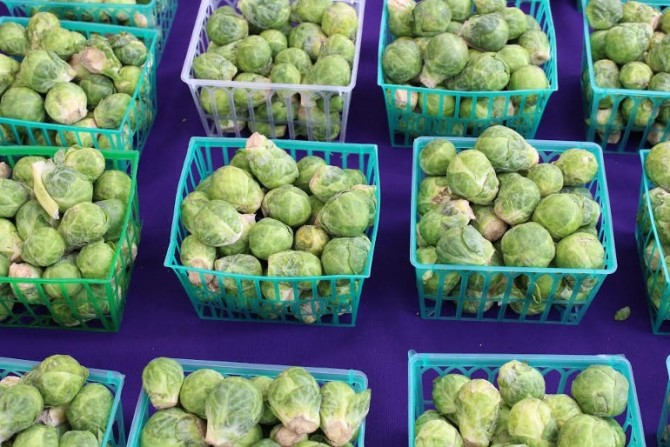
Photo by Kimberly Chang-Haines
AKA hit up your local farmers’ market and chat up the sellers. Here are some meaningful questions you may want to ask before you make any purchases. Be sure to stick with the products that were raised in the most sustainable way. Think humane animal treatment, no pesticides, etc…
Buying from local farmers is a great way to ensure that your food is fresh and as full of nutrients as possible, too. When you buy food from the grocery store, chances are it’s traveled a long way before it reaches your stomach and therefore has lost a lot of the good stuff on its journey.
Since food is meant to strengthen and nourish our bodies, wouldn’t it be reasonable to eat the things that are going to benefit our systems the most? It just makes sense.
19. Drink loose-leaf tea.
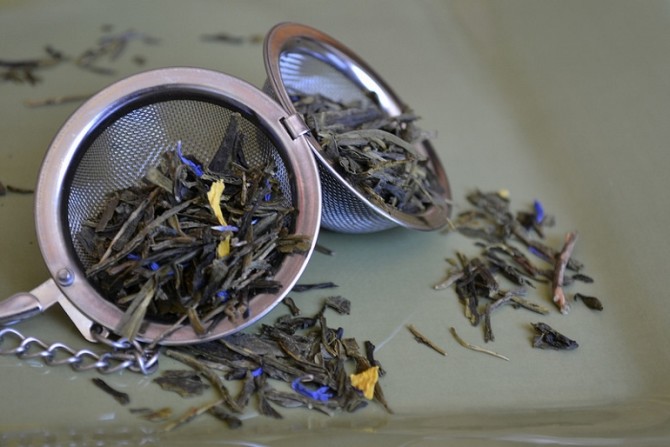
Photo by Ana Cvetkovic
Tea bags, while convenient, are wasteful. Usually the little tea satchels are partly made of plastics that you can’t just throw in the recycling bin. So what happens? Trash.
When you buy loose-leaf tea (Protip: take it home in your own container), you take the bag out of the equation. Some people swear loose-leaf tea tastes better, too, so if that’s what gets you to make the swap, so be it.
20. Eat less.

Photo by Tara Botwinick
I can feel the tension as you read these words, but hey, I’m not here to judge. The fact of the matter is that Americans suffer from major portion distortion. We could eat a lot less every day and still get by just fine.
Eating less food means you get more mileage out of your weekly groceries. What if you could get even just three or four more meals out of them? Imagine how much money you could save over time.
Eating just the right amount of food to fuel your body is the epitome of living a reasonable, responsible and easily maintainable life (AKA a sustainable life). Check out these portion control hacks if you need steering in the right direction.
21. Make your own staples.

Photo by Sydney Segal
Save the world the energy, chemicals and resources it takes to produce, preserve and package a lot of your favorite staples by making them on your own. Bypass store-bought granola for this homemade recipe. Crank out your own peanut butter. Heck, you can even bake your own bread.
Even picking just two or three items to make at home can have a significant impact. Challenge yourself, but don’t kill yourself. We’re busy people, after all. (But homemade granola is totally worth an hour less of sleep, just sayin’.)
22. Read food labels.
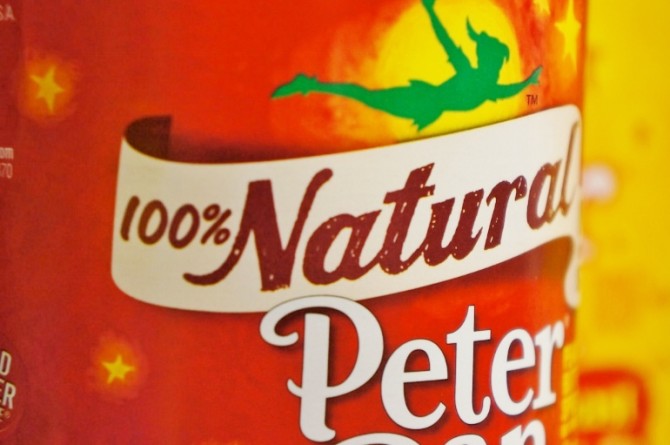
Photo by Sean Koetting
Read yo’ food labels and understand what they mean. If you’re looking for organic stuff, which is usually the most environmentally-friendly option, you’ll want to look for the USDA Certified Organic label. If it says it’s organic, but it doesn’t boast that certification, you may want to be skeptical.
Check out this article to become a food label expert, and here’s some other super important info about the labels on egg cartons.
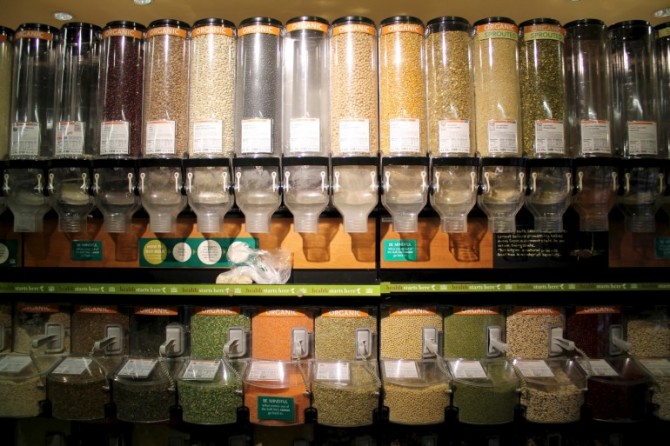
Photo by Caty Schnack
Buying in bulk does two really good things: it (usually) saves you money and it keeps more plastic packaging out of the garbage can. When you bring your own bags or mason jars to the bulk section, you eliminate the need for plastic packaging entirely. Basically, the more foods you buy in bulk, the better it is for the environment.
You can purchase beans, grains, pasta, nuts, spices and all kinds of other yummy things in bulk. This way of shopping also lets you purchase just what you need, so no 12 oz. of leftover lentils for you. Here are some tips on how to navigate the land of the bulk bins.
24. Celebrate meatless Monday.
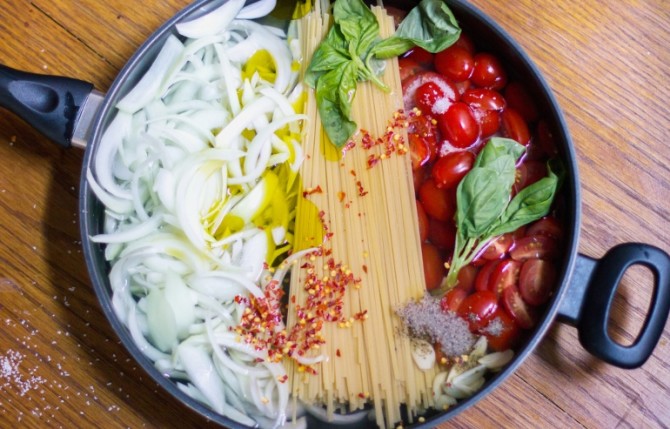
Photo by Abigail Wang
We’ve already talked about how to buy meat, but now we need to talk about how often you buy it. A lot of people discount organic meat-raising methods because it doesn’t yield enough meat to meet the world’s demand. While I wish I could laugh at those people, they may actually be kind of right.
That’s why we need to reconsider how often we’re eating beef, chicken and pork. Less steaks and drumsticks are worth the humane treatment of animals, don’t you think?
Think about it: It’s more sustainable to take a break from meat one day per week than to not make any cutbacks in your meat consumption at all. If you’re used to buying enough meat to feed you every day of the week, try buying just enough to get you through five or six days.
Someone once told me that eating meat was a celebration, and I loved that concept. There are other ways to get protein, after all.
25. Use homemade cleaning products in your kitchen.
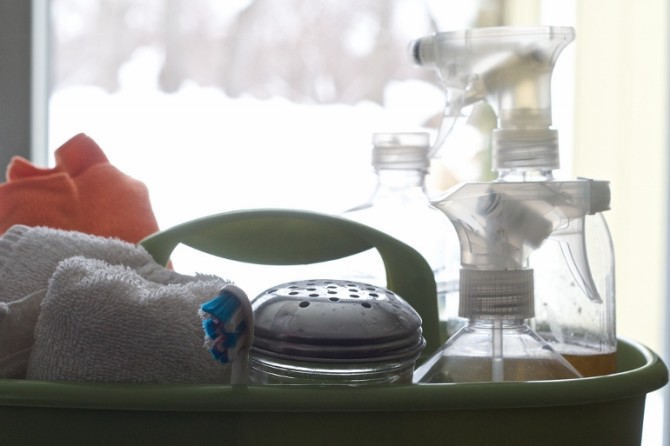
Photo courtesy of Flickr user Chiot’s Run
You don’t even want to think about how many harmful chemicals are sitting beneath your kitchen sink, just waiting to take over your dirty counter tops with a couple spritzes of a bottle. It’s yuck for you and yuck for the environment.
Instead, make your own cleaning supplies with easily accessible ingredients like baking soda so you can clean your kitchen the safe way.
26. Change your thinking.

Photo courtesy of Flickr user Klearchos Kapoutsis
Lifestyle adjustments take time, but if you’re really serious about being a more conscious citizen of planet Earth, it’s going to take some mental rewiring as well. It’s so easy to get caught up in things like convenience and instant gratification, but a sustainable life sometimes requires you to put the world’s well-being before your own.
What if you really did think eating meat was a celebration instead of a daily habit? What if you could prioritize making some of your own products instead of buying them at the store? Ask yourself the tough questions and see if you can find an answer the works for you.
Yes, sustainability entails sacrifice. But a healthy planet and a healthy me? So worth it.

